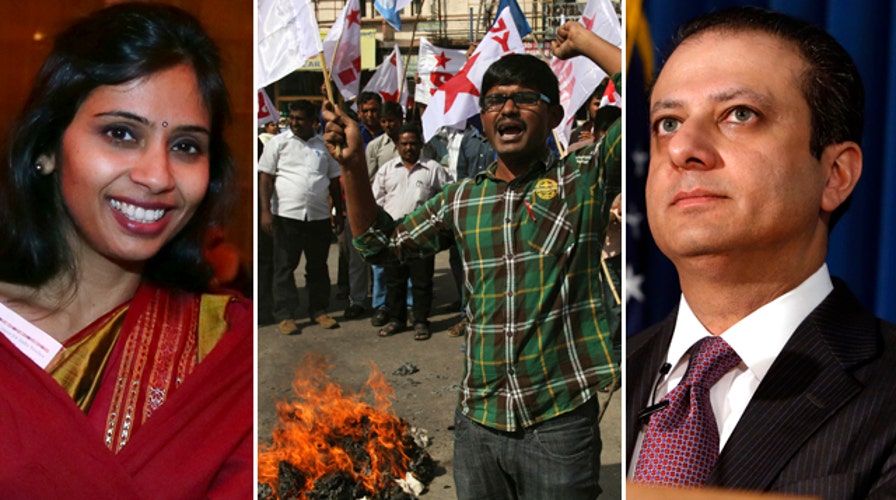While international outrage mounts over the arrest of an Indian diplomat in New York, the purported victim in the case -- an allegedly underpaid housekeeper -- has been largely overlooked.
The federal prosecutor in the case, U.S. Attorney Preet Bharara, is now trying to draw attention to her apparent plight as he battles critics of the U.S. government's actions and those calling for the diplomat's release. He also confirmed that the housekeeper's family had to be brought to the U.S. amid harassment in India.
The consular official, Devyani Khobragade, was arrested and strip-searched last week. Khobragade, 39, was accused of paying her housekeeper -- Sangeeta Richard -- in rupees amounting to just $3.31 per hour, then forcing her to sign a fraudulent contract submitted with her visa application.
Indian officials complained the treatment of the diplomat was heavy-handed, touching off a diplomatic clash which has escalated over the past several days.
But Bharara, in a detailed statement defending his actions, sought to remind the public about the housekeeper -- and lamented there was "precious little outrage" about her and her spouse. He suggested the Indian government's attitude toward the case might be colored by views of class and status, which remain powerful forces in India.
"This Office's sole motivation in this case, as in all cases, is to uphold the rule of law, protect victims, and hold accountable anyone who breaks the law -- no matter what their societal status and no matter how powerful, rich or connected they are," he said.
Bharara confirmed that Richard's family was brought to the U.S. while prosecutors pursued the visa fraud case against Khobragade, a deputy consul general at India’s New York consulate. He said the housekeeper, who lived in New York and worked for Khobragade from November, 2012, to June, 2013, was being targeted by a legal proceeding in India in an effort to silence her, and implied that her family was brought to the U.S. for their protection.
“Some focus should perhaps be put on why it was necessary to evacuate the family and what actions were taken in India vis-à-vis them,” he said. “This Office and the Justice Department are compelled to make sure that victims, witnesses and their families are safe and secure while cases are pending.”
The arrest of Khobragade last week has inflamed tensions with India, and prompted Secretary of State John Kerry to express "regret." But Bharara, himself a native of India, said the housekeeper is the victim, not Khobragade.
An official in India's External Affairs Ministry told The Associated Press that Khobragade claimed to Indian authorities in July that the housekeeper had disappeared and was trying to blackmail her. According to the official, she said she would not report Khobragade if she agreed to pay her more money and change her visa status to allow her to work elsewhere in the U.S.
Domestic staff are frequently forced to work long hours for substandard wages in India and there have been numerous reports of housekeepers, maids and nannies being imprisoned or abused by their employers.
Prosecutors say Khobragade agreed to pay the housekeeper 30,000 rupees per month, a sum equal to about $575. At 40 hours per week, the wage works out to just $3.31. But Khobragade allegedly submitted another contract with the housekeeper’s visa application that listed her wage at $9.75 per hour.
“Khobragade instructed [the housekeeper] not to say anything about being paid 30,000 rupees per month,” State Department Special Agent Mark Smith stated in the federal complaint against Khobragade.
Smith further stated that the visa application for the housekeeper could not have been approved under the secret contract, which did not meet federal employment standards.
Khobragade could face a maximum sentence of 10 years for visa fraud and five years for making a false declaration if convicted. She claims to have full diplomatic immunity, but the State Department says her immunity from prosecution is limited to acts performed in the course of her official duties.





